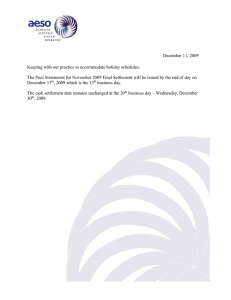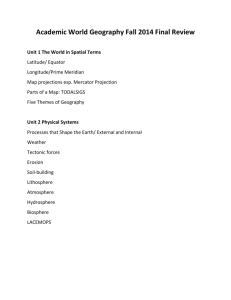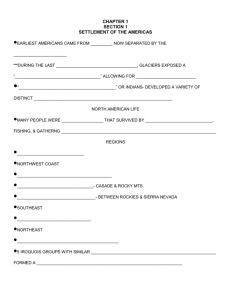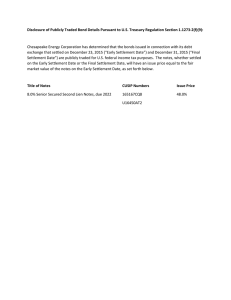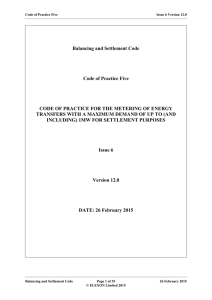August 5, 2009 Meeting of the Settlement subgroup Attending:
advertisement
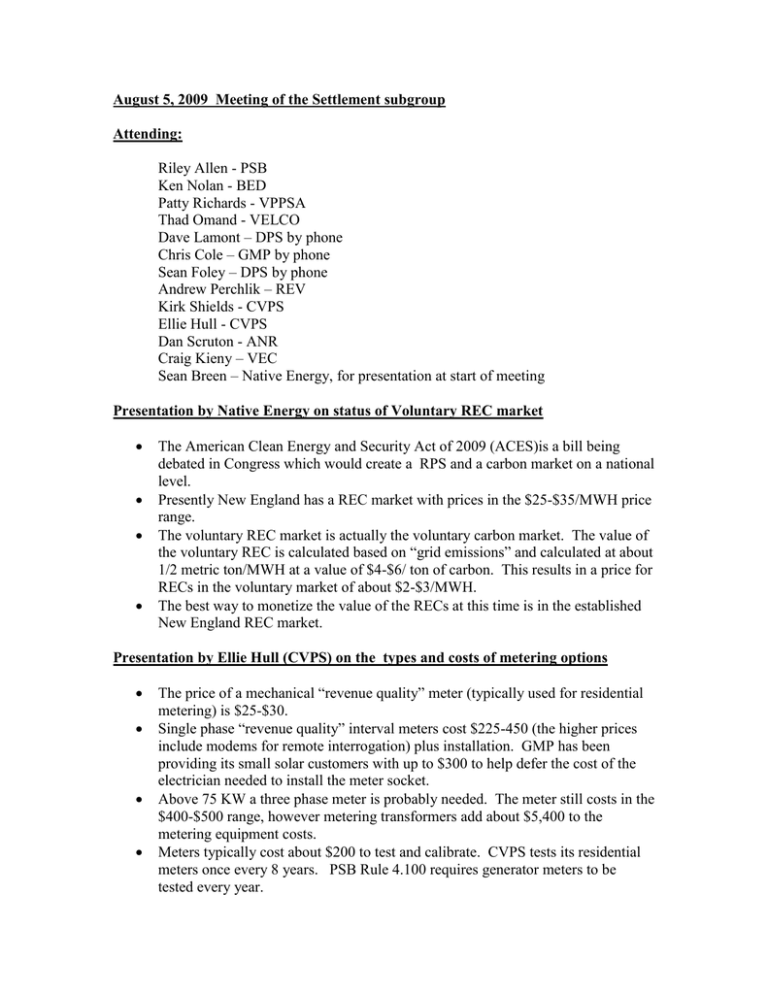
August 5, 2009 Meeting of the Settlement subgroup Attending: Riley Allen - PSB Ken Nolan - BED Patty Richards - VPPSA Thad Omand - VELCO Dave Lamont – DPS by phone Chris Cole – GMP by phone Sean Foley – DPS by phone Andrew Perchlik – REV Kirk Shields - CVPS Ellie Hull - CVPS Dan Scruton - ANR Craig Kieny – VEC Sean Breen – Native Energy, for presentation at start of meeting Presentation by Native Energy on status of Voluntary REC market The American Clean Energy and Security Act of 2009 (ACES)is a bill being debated in Congress which would create a RPS and a carbon market on a national level. Presently New England has a REC market with prices in the $25-$35/MWH price range. The voluntary REC market is actually the voluntary carbon market. The value of the voluntary REC is calculated based on “grid emissions” and calculated at about 1/2 metric ton/MWH at a value of $4-$6/ ton of carbon. This results in a price for RECs in the voluntary market of about $2-$3/MWH. The best way to monetize the value of the RECs at this time is in the established New England REC market. Presentation by Ellie Hull (CVPS) on the types and costs of metering options The price of a mechanical “revenue quality” meter (typically used for residential metering) is $25-$30. Single phase “revenue quality” interval meters cost $225-450 (the higher prices include modems for remote interrogation) plus installation. GMP has been providing its small solar customers with up to $300 to help defer the cost of the electrician needed to install the meter socket. Above 75 KW a three phase meter is probably needed. The meter still costs in the $400-$500 range, however metering transformers add about $5,400 to the metering equipment costs. Meters typically cost about $200 to test and calibrate. CVPS tests its residential meters once every 8 years. PSB Rule 4.100 requires generator meters to be tested every year. Ellie informed the group that when/if smart metering comes about all meters in Vermont will be able to be interrogated cheaply and the metering itself will be cheaper. Smart metering may be available in 90% of Vermont by 2012. Review of Draft Settlement Procedure prepared by John Spencer (VEPP Inc.) The draft settlement proposal contains two methods of project settlement depending on project size. The 50 KW separating the two methods contained in the draft proposal is an arbitrary size. The subgroup will have to determine the appropriate size. The settlement method for the larger size projects appeared to be generally acceptable to the group. There was discussion about providing the group’s rational to Board when recommendations are submitted. (Riley said the Board staff is looking for recommendations from the subgroup by the end of August). There was a question regarding the need for the Producers to pay 50% of the SPEED Facilitators administrative costs since administrative costs may just be added to the standard offer rate. Riley commented that there is precedence in having the Producer pay 50% of the administrative costs. The group did not reach agreement with the proposal to settle the smaller projects as load reducers to the host utilities, with the reasoning being that smaller projects will be developed at locations and in volumes generally pro-rata to the various utility’s retail load. The primary concern was that any one utility might get more than its share of these small projects which would cause a financial burden to that utility. Patty brought up the example of one of VPPSA’s members, Jacksonville, which has a peak load of less than 2 MW. Ken felt it would be more accurate to use the VELCO load settlement process for all projects. Thad was dubious that VELCO could process the information if there were many small projects. John brought up the problem regarding a utility’s ability to opt out of the program if they already had enough new renewable power (e.g. WEC). The group agreed to think about the problem of settling the small projects and the costs of the various alternatives for settlement. The next meeting of the settlement subgroup was set for 1:00 PM at the 4th floor conference room of the PSB on August 13th. Tentatively the last meeting of the subgroup will take place on August 25th at a time and location to be determined.
